Senior Lecturer in Mental Health Nursing
Mental Health Nursing BSc (Hons)
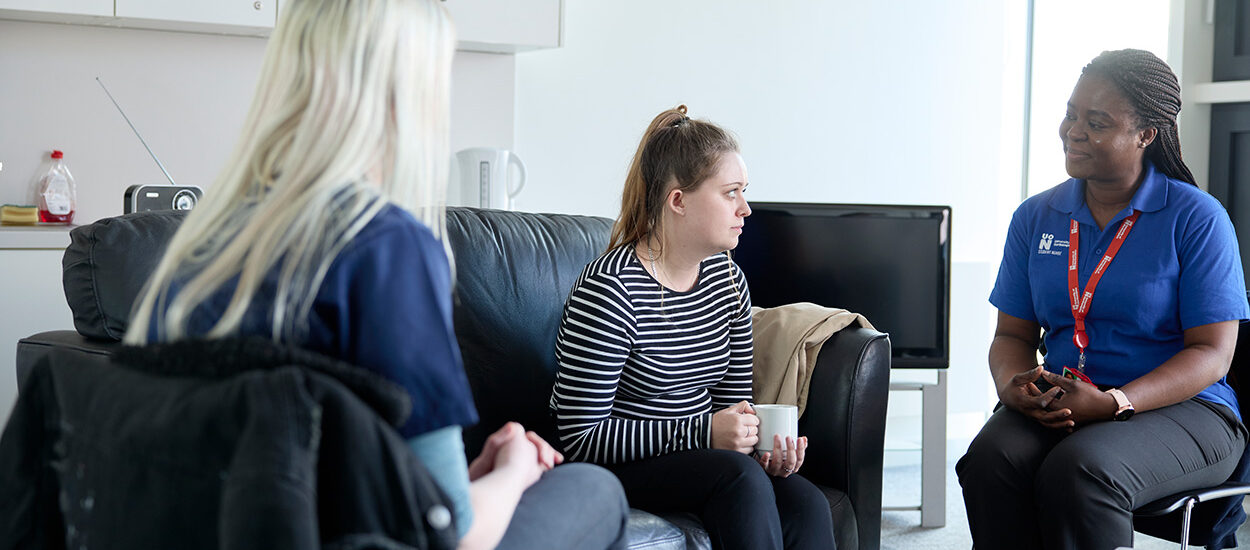
Mental Health Nursing BSc (Hons)
- Home
- Courses by subject
- Mental Health Nursing BSc (Hons)
Key Facts
-
UCAS Code
B710
-
Level
UndergraduateUG BSc (Hons)
-
Duration
3 years Full-time
-
Starting
September
-
BCC at A level
DMM at BTEC -
Full Time £9,535
-
Full Time: £18,200
-
Waterside
Updated 09/04/2025
Updated 09/04/2025
Get in touch
For questions regarding study and admissions please contact us:
UK STUDENTS ENQUIRIES
study@northampton.ac.uk
0300 303 2772
INTERNATIONAL STUDENTS ENQUIRIES
The University of Northampton’s mental health nursing course takes you on a service user’s journey within community and hospital settings, allowing you to see the service through the patient’s perspective and identify where you can make positive changes.
The BSc mental health nursing degree reinforces your positive attitude, provides you with evidence-based knowledge and equips you with effective practice skills, through a flexible and blended approach to learning. We also offer extra student support throughout your studies and during your practice. This means that you will be supported by a nursing academic during your mental health nursing placements at a hospital.
Top 10 For Mental Health Nursing
The University of Northampton is a top 10 institution for Mental Health Nursing in the Best UK University Guardian League table for 2025.
Top 10 For Nursing & Midwifery
Our nursing and midwifery courses are joined top 10 in the Daily Mail University League table for 2025.
Our three-year mental health nursing degree gives you the ability to cope with a demanding and satisfying profession, leading to a BSc (Hons) Mental Health Nursing qualification and a registration with the Nursing and Midwifery Council (NMC).
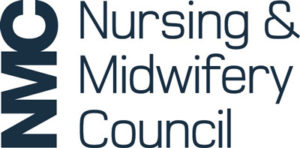
Highlights
- Leads to Nursing and Midwifery Council (NMC) registration.
- Access to a wide variety of local and national mental health nursing placements.
- Mental Health First Aid (MHFA) delivered within this programme.
- You may be eligible for financial support through the NHS Learning Support Fund (NHS LSF)*
- Guaranteed paid internship with the Northampton Employment Promise.
- HP laptop and software included with this course for eligible mental health nursing students* (*see eligibility criteria and terms and conditions).

The Learning Hub is the biggest building on campus, home to our Student Information Desk, 24/7 library, teaching spaces, cafes, and more.

The big and spacious modern Senate building has various types of learning spaces, teaching rooms, our Bloomberg suite, Morley Room lecture hall, and cafes.

Waterside campus has everything students needs from: Learning Hub featuring 24/7 library, Creative Hub, on-site shop, restaurant, cafes and food outlets, multi-faith chaplaincy, student village hall, Students' Union and more. With only a short walk over the bridge into the town centre.

The Learning Hub and Student Information Desk would be a student's first point of call when needing support.

Our library covers three floors of the Learning Hub, with IT rich learning environments, including silent and group study spaces, physical books. Don't forget there are plenty more resources available online!

The Student Information Desk is the first place a student should go if they need any help. Here the team can direct you to academic support, mental health support, financial support, IT support, and more.

The Learning Hub is where every student will go for library support and classes, as well as food outlets and social events.

The Learning Hub also has lots of outdoor space for meeting with friends or finding some silent time between classes.

The Learning Hub is the biggest building on campus, home to our Student Information Desk, 24/7 library, teaching spaces, cafes, and more.

The big and spacious modern Senate building has various types of learning spaces, teaching rooms, our Bloomberg suite, Morley Room lecture hall, and cafes.

Waterside campus has everything students needs from: Learning Hub featuring 24/7 library, Creative Hub, on-site shop, restaurant, cafes and food outlets, multi-faith chaplaincy, student village hall, Students' Union and more. With only a short walk over the bridge into the town centre.

The Learning Hub and Student Information Desk would be a student's first point of call when needing support.
Entry Requirements
You need one of the following qualifications:
- BCC at A level
- BTEC level 3 Extended Diploma or National Diploma or Cambridge Technical at DMM
- T Level – Pass (with a C in Core or above)
- A kitemarked Access to Higher Education course with 30 credits at Merit or above
- Successful completion of the first year of a relevant Foundation Degree
- Health and Social Care Diploma at Level 3 (advanced level)
- CACHE Diploma achieved at grade B or above.
We welcome applications from students with a mix of A levels and BTEC/Cambridge Technical qualifications.
Please note that we may consider other qualifications not listed above on an individual basis, please contact our Admissions team to discuss these in further detail.
-
The following are essential Mental Health Nursing entry requirements for all pre-registration nursing programmes;
Applicants must be 18 years old by the 2nd month of commencing pre-registration nursing programmes and all applicants must have 10 years of consecutive education.
All mental health nursing applicants must have:
- English Language and Maths GCSE, or the equivalent, at grade C/4 or above. These must be achieved prior to commencement of the course. (Common equivalents are: Functional skills level 2 and 3, Key skills level 2 and 3, Adult Literacy/Numeracy Level 2).
All offers of a place on the mental health nursing degree are subject to:
- successful Occupational Health Screening,
- satisfactory Disclosure and Barring Service (DBS) report, and
- successful interview at the University.
-
All International and EU students applying for the mental health nurse course with us must meet the following minimum English language requirements:
- IELTS 7.0 with no lower than 7.0 in Reading, Listening and Speaking as well as no lower than 6.5 in Writing for study at the undergraduate level.
For more information on the Nursing and Midwifery Council (NMC) English language entry criteria, please follow the NMC website.
For information regarding English language requirements at the University, please see our IELTS page.
-
After applying via UCAS and meeting the entry requirements for the mental health degree, you will be invited to an interview. You will be interviewed by a Mental Health Nursing academic, a clinician or a service user.
You will receive further information, and the interview preparation instructions, from us by email before your interview. If you have any questions, please email us at: interviews@northampton.ac.uk.
As part of your interview preparation, look out for health features in national newspapers. We also recommend you keep up to date with current health care and nursing issues by visiting the following sites:
News: Nursing student makes headlines as guest editor for national publication
UON Mental Health Nursing student Chioma Vivian Ezunu guest edits the Nursing Times. "During my degree, I’ve learned about the importance of reflective practice and good reflection includes learning from comments and suggestions when on placement."
Course Content
-
This mental health nursing degree has been designed to contribute towards achieving the following United Nations Sustainable Development Goals: SDG3 of Good Health and Wellbeing and SDG5 Gender Equality.
There is no health without mental health. One in four people are likely to experience some degree of mental distress. A mental health nurse can make a positive contribution in people’s lives and wellbeing. Our vision is to promote compassionate care through effective communication.
We want to make this a reality by recruiting people who are passionate about caring for those with mental health problems and that want to make positive changes to the lives of others. On successful completion of the BSc (Hons) Mental Health Nursing degree, you will be able to apply for registration with the Nursing and Midwifery Council as a mental health nurse.
Taught elements will include:
- public and population health
- assessing planning and providing care
- leading nursing care
- working in teams
- coordinating and improving quality of care.
If you already hold a professional registration you can study for a second registration. You will study generic and Mental Health Nursing specific modules, focusing on the care of individuals with mental health problems. Your modules are also complemented by appropriate placement learning opportunities within hospitals and the community.
‘Being Brilliant’ at Northampton focuses on ways of thinking and behaving that allows us to be the best version of ourselves. To develop a culture where all students and staff aspire to be the best that they can be, the principles are simple and focus on small changes in behaviour that can have a big impact. If you want to become a brilliant mental health nurse then we can inspire you and transform your life and the lives of others.
List of modules:
Please note the modules shown here relate to the academic year 24/25. The modules relating to the academic year 25/26 will be available from June 2025.
-
-
Interprofessional Education (IPE)
Module code: FHS_IPE20Status: Compulsory
-
Discovering My Identity as a Nurse (20 Credits)
Module code: NPR1027Status: CompulsoryThe purpose of this module is to develop nursing students self awareness, personal and professional resilience and professional identity as a nurse understanding how health science, social and political knowledge, behaviour, vocabulary and skills form their nursing identity. Additionally the module will develop communication skills and understanding of how constructive feedback can be used to evaluate self and effect positive change.
-
Professionalism and Public Protection in Nursing (20 Credits)
Module code: NPR1028Status: CompulsoryThe purpose of this module is to provide the student nurse with underpinning theoretical knowledge of the scientific, legal, professional and personal context of nursing in order to participate in practice safely, ethically and lawfully across all fields of nursing and within a range of clinical practice settings.
-
Exploring the Evidence Base for Nursing (20 Credits)
Module code: NPR1029Status: CompulsoryThe purpose of this module is to equip nursing students with the theoretical foundation, skills and evidenced based knowledge to fully participate in person centred decision making, influence positive lifestyle choices and beginning the students? own professional development.
-
Guided Participation in Nursing Care (60 Credits)
Module code: NPR1031PStatus: CompulsoryThe purpose of this module is to provide the essential clinical learning and simulation and practice experiences a student requires to achieve the NMC proficiencies, enabling progression through to the 2nd part of the programme. Through their electronic portfolio (Pebblepad), signed by their practice supervisor and practice assessor, and moderated by the academic assessor, students will demonstrate achievement of the skills and professional behaviours identified at the first progression point by the Nursing and Midwifery Council. During clinical learning all students will be required to undertake clinical skills via a range of simulation techniques to meet the Achievement of Proficiency in the PAD. These will be signed off by the Module Team/Practice Assessor.
-
Interprofessional Education (IPE)
-
-
Constructing and Developing My Nursing Identity (20 Credits)
Module code: NPR2067Status: CompulsoryThe purpose of this module is to further develop adult, children and young people?s, mental health and learning disability nursing students self-awareness, personal and professional resilience and professional identity as a nurse, deepening understanding of how health science, social and political knowledge, behaviour, vocabulary and skills form their nurse identity and enable them to problem solve within their field of nursing. Additionally the module will further develop communication skills including responding to constructive feedback to evaluate self and effect positive change.
-
Applying Understanding of Nursing Professionalism and Protection of the Public in Nursing (20 Credits)
Module code: NPR2068Status: CompulsoryThe purpose of this module is to build on and further develop adult, children and young people?s, learning disability and mental health student nurses theoretical knowledge, advancing their critical understanding and application of the generic and field specific scientific, legal and professional context of nursing, enabling them to initiate safe practice that is ethical and lawful across all fields of nursing and within a range of clinical practice settings.
-
Interpreting the Evidence Base Influencing Mental Health Nursing (20 Credits)
Module code: NPR2072Status: CompulsoryThe purpose of this module is to further develop Mental Health nursing students professional development, theoretical foundation, skills and evidenced based knowledge to initiate person centred decision making, influence positive lifestyle choices, improve health outcomes and understand the appropriateness and quality of care to effect service improvement.
-
Active Participation in Nursing Care (60 Credits)
Module code: NPR2074PStatus: CompulsoryThe purpose of this module is to provide the essential clinical learning and simulation and practice experiences students require to achieve the set of NMC proficiencies enabling progression through to the 3rd part of the programme. Through the electronic portfolio (Pebblepad), signed by their practice supervisor and practice assessor, and moderated by the academic assessor, students will demonstrate achievement of the skills and professional behaviours, relevant to chosen field of nursing, identified at the second progression point by the Nursing and midwifery council. During clinical learning all students will be required to undertake clinical skills via a range of simulation techniques to meet the Achievement of Proficiency in the PAD. These will be signed off by the Module Team/Practice Assessor.
-
Constructing and Developing My Nursing Identity (20 Credits)
-
-
Developing My Nurse Identity Towards Becoming a Registrant (20 Credits)
Module code: NPR3035Status: DesignateThe purpose of this module is to further develop adult, children and young people?s, learning disability and mental health nursing students critical self awareness, personal and professional resilience and professional identity as a nurse, deepening understanding of how complex health science, social and political knowledge, behaviour, vocabulary and skills enable collaborative leadership and effect change management within their chosen field. Additionally the module will further develop advanced communication skills including delivering constructive feedback to effect positive change.
-
Becoming a Professional, Responsible, and Accountable Registered Nurse (20 Credits)
Module code: NPR3036Status: DesignateThe purpose of this module is to further develop the adult, children and young people's, learning disability and mental health student nurses wide ranging theoretical knowledge, enabling them to critically evaluate, lead, manage and reflect on the application of the scientific, legal and professional context of nursing in their chosen field, ensuring safe, ethical and lawful practice across all fields of nursing and in a range of clinical practice settings.
-
Demonstrating Competence and Confidence in Safe, Effective Administration and Optimization of Medicines and the Health Numeracy Assessment
Module code: NPR3037Status: CompulsoryThe purpose of this module is to ensure adult, children and young people's, learning disability and mental health student nurses knowledge and understanding of pharmacology, the principles of safe effective administration and optimisation of medicines, their proficiency and accuracy when calculating dosages of prescribed medicines and their application of the health numeracy assessment, in the relevant clinical setting is complete, enabling student nurses to join the NMC nursing register in their chosen field, with the ability to progress to a prescribing qualification following registration.
-
Leading and Coordinating Mental Health Nursing Care (60 Credits)
Module code: NPR3041PStatus: CompulsoryThe purpose of this module is to provide the essential clinical learning through simulation and practice experiences Mental health nursing students require to achieve completion of the set of NMC proficiencies enabling registration. Through the electronic portfolio (Pebblepad), signed by their practice supervisor and practice assessor, and moderated by the academic assessor, Mental health nursing students will demonstrate achievement of the skills and professional behaviours identified by the Nursing and midwifery council. During clinical learning all students will be required to undertake clinical skills via a range of simulation techniques to meet the Achievement of Proficiency in the PAD. These will be signed off by the Module Team/Practice Assessor.
-
Transforming and Innovating Mental Health Nursing (20 Credits)
Module code: NPR4008Status: DesignateThe purpose of this module is to continue the development of Mental Health nursing students professional development, theoretical evidenced based knowledge and skills to enable them to lead and mange person centred decision making, respectfully influencing positive lifestyle choices to improve health outcomes and exert influence on the appropriateness and quality of care to effect service improvement
-
Developing My Nurse Identity Towards Becoming a Registrant (20 Credits)
-
You will be expected to study a minimum of 2,300 hours theory and 2,300 hours practice across the 3 years. The practical placements that you will take throughout this Mental Health Nursing course will be in a variety of health, education and social care settings.
The practical experiences in healthcare are gained within private, voluntary and independent sector areas including social care, community trusts and hospitals within Northamptonshire, Buckinghamshire and surrounding areas.
This Mental Health Nursing University Course is compliant with Nursing and Midwifery Council (NMC) requirements.
-
BSc Mental Health Nursing has been approved by the Nursing and Midwifery Council (NMC). This means you can be confident that this mental health nursing course meets the standards of education, training, conduct and performance required for nurses in the UK.
After successful completion of this programme, you’ll be awarded an honours degree and can register as a mental health nurse the Nursing and Midwifery Council (NMC). This will allow you to practice in accordance with the NHS Constitution which is underpinned by the core NHS values.

-
The University of Northampton is one of only four universities in the country to belong to the European Nursing Module. This offers the possibility of a two week placement in one of around 24 different European countries.
You can experience a different health system, culture and life experience and gain an insight into the issues that are faced in an overseas nursing environment. This opportunity is available at a specifically negotiated time during your course, usually within the second or third stage of study.
Please note that you will have to meet the entire costs of this module yourself including flights, accommodation, food and travel within these countries where possible costs are kept to a minimum and financial help is available. The cost of the placement is dependent on the country you choose, it can range from approximately £500-800.
The two weeks spent overseas for this module count as placement hours as agreed with the NMC.
The University of Northampton is one of only three universities that offer this module as well as the 11 week Erasmus placement.
-
At the University of Northampton, everything we do, from funded trips to paid internships, is to give you everything you need to make a difference when you leave.
If you join our full-time BSc Mental Health Nursing degree at Northampton, you will receive a laptop when your course begins*. The laptops are built to a bespoke custom specification ideal for use in the seminar room, collaborative group work or studying at home.
Whatever your ambitions, we’re here to help you to achieve them. We’ll support you to identify the skills you’re learning during your course, find your strengths and secure practical experience so that when it comes to applying for jobs or further study you’ll feel confident in standing out from the crowd. We’ve created the Northampton Employment Promise because we are so confident that if you focus on your studies and complete one of our awards you’ll be highly employable by the time you graduate. Putting you in a great position to secure employment or continue your studies.
To check out the full list of perks, visit our Student Perks page or dedicated International Perks page.
* UK fee payers only (see Terms and Conditions for further details)
-
How will I develop my skills in nursing labs?
The nursing skills labs, based at our Waterside campus, are used throughout the mental health nursing degree to enhance learning in the clinical settings. The Nursing labs have a purpose-built clinical ward where students can learn and develop their clinical skills through practice-based, hands-on education. You will practise scenarios from a real-life hospital ward in a realistic, yet safe clinical environment.
The fully interactive VR (Virtual Reality) system and mannequins allow students to ‘treat’ people in a variety of nursing settings, giving them ‘as close to real-life as possible’ training. This includes actual conversations with the characters in the scenario and gives clinical feedback that is matched to the student’s learning objectives.
How will I be taught on the Mental Health Nursing degree?
You will have approximately 4,600 hours of blended study throughout the three years of this mental health nursing course, which is split 50/50 between theoretical and practical learning.
This course is compliant with Nursing and Midwifery Council requirements. You will be expected to study a minimum of 2,300 hours theory and 2,300 hours practice across the 3 years. For more information on educational standards required for nursing please visit the Nursing and Midwifery Council web pages.
From September 2019 we are offering an exciting new curriculum based on The Nursing and Midwifery standards for education 2018. The curriculum is innovative utilising an active blend learning approach and an extensive range of support is always available. The curriculum also offers placement learning opportunities throughout Northamptonshire and beyond.
How will I be assessed?
You will be continuously assessed throughout this mental health nursing course to test your knowledge. Placements will also be assessed to ensure that you can effectively apply theory into practice within a healthcare environment.
Are there any further opportunities?
Our University is now a part of a well-established, professional European network for Nursing and Midwifery. The Florence Network offers opportunities for future health careers and development to staff, academics and students. For more information visit the Florence Network.*
What is the selection process based on?
Values Based Recruitment is an approach which attracts and selects students, trainees or employees on the basis that their individual values and behaviours align with the values of the NHS Constitution.
The purpose of Values Based Recruitment is to ensure that the future and current NHS workforce is selected against the values of the NHS Constitution, so that we recruit people with the right skills and values to support effective team working in delivering excellent patient care.
Please visit the Health Education England website for more details.
Worried about student finance?
Get all the info you need ahead of time, before you can apply for funding in Spring on our fees and funding pages.
Fees and Funding
2025/26 Tuition Fees
- UK Full Time: £9,535
- International Full Time: £18,200
Fees quoted relate to study mental health nursing in the Academic Year 2025/26 only and may be subject to inflationary increases in future years. UON will adjust UK fees annually in line with Government Policy.
-
Please be aware that there will be additional costs that are not covered by Mental Health Degree fees, these include:
- Travel costs to and from placements, and extra costs associate with placements, may be incurred throughout your studies depending on where you are based.
- shoes for placement
- appropriate outer wear
- car parking fees on/off site
- optional European placement (flights, accommodation, living expenses, etc.)
- other costs: dissertation printing, books, stationary purchases, IT costs
- living and eating costs
- accommodation
- participation in events.
-
Students, studying nursing, midwifery and many of the allied health professions courses from September 2020, may be eligible for a payment of at least £5,000 a year which they will not need to pay back. They may be able to apply for Financial support at the university through the NHS Learning Support Fund (NHS LSF) which offers eligible students additional support while studying for their degree. This is in addition to the Student Loan from the Student Loans Company.
Financial contribution towards your travel, and expenses in relation to your practice learning opportunities, may be available to you from the NHS Learning Support Fund. Details, including eligibility criteria, can be found on the NHS website.
The information provided above is correct for the academic year 2024/25 but please check the NHS LSF website for full details, any changes and updates.
For more information about possible funding options, please visit our Fees and Funding pages.
-
Fees quoted relate to study mental health nursing in the Academic Year 24/25 only and may be subject to inflationary increases in future years.
- UK – Full Time: £9,250
- International – Full Time: £17,700
Staff
Careers and Employability
On completion of this BSc Mental Health Nursing Course, you can pursue a wide range of professional careers in health and social care and research.
As a Mental Health Nurse, you can work in hospitals or in the community. If you work in a residential setting, you may do shifts and provide 24-hour care. Within a hospital you might work in a psychiatric intensive care unit, psychiatric ward, outpatients unit, or a specialist unit dealing with eating disorders.
In the community you could work at a GP surgery, prison, community health care centre, residential centre or patients’ own homes.
For further information visit the NHS careers webpage.
Master’s Opportunities
Our postgraduate and Master’s courses are a great way to enhance the skills you have already learnt. Benefit from our 20% alumni discount on postgraduate fees to give you a CV that will catch the eye of employers.
Successful completion of this mental health nursing course could lead on to one of our Master’s programmes: MSc Public Health, MSc Advanced Clinical Practice, MSc Child and Adolescent Mental Health.
At the University of Northampton, we offer a range of short courses and continuing professional development (CPD) programmes. These will enable you to learn new skills, progress into specialisms or take on new responsibilities.
Facilities
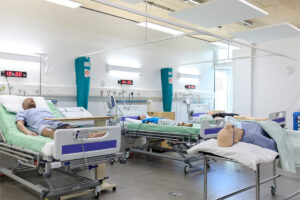
A realistic, acute clinical environment with mannequins, hospital beds, medical gases systems, clinical equipment, and more.
Clinical Skills Simulation Lab

The Learning Hub is at the heart of the campus and home to the student information desk.
Learning Hub

A realistic, acute clinical environment with mannequins, hospital beds, medical gases systems, clinical equipment, and more.
Clinical Skills Simulation Lab

The Learning Hub is at the heart of the campus and home to the student information desk.
Learning Hub

A realistic, acute clinical environment with mannequins, hospital beds, medical gases systems, clinical equipment, and more.
Clinical Skills Simulation Lab

The Learning Hub is at the heart of the campus and home to the student information desk.
Learning Hub

A realistic, acute clinical environment with mannequins, hospital beds, medical gases systems, clinical equipment, and more.
Clinical Skills Simulation Lab
Related Courses
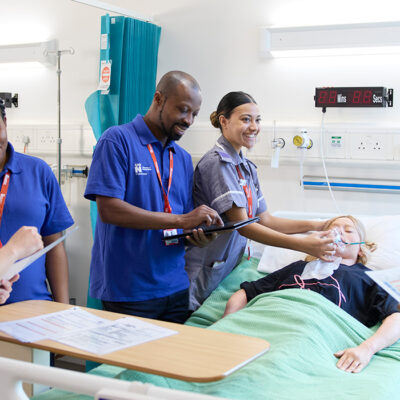
Adult Nursing BSc (Hons)
Our nursing course will give you the ability to cope with a demanding and satisfying profession...
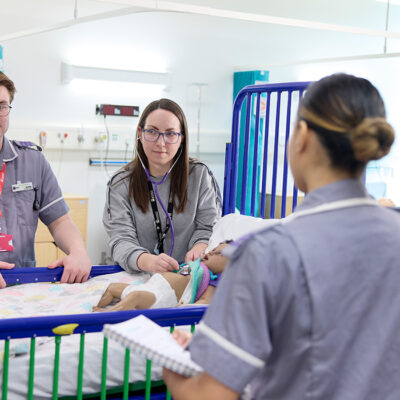
Children and Young People’s Nursing BSc (Hons)
Children and Young People’s Nursing will provide you with the capability to cope with a demanding...
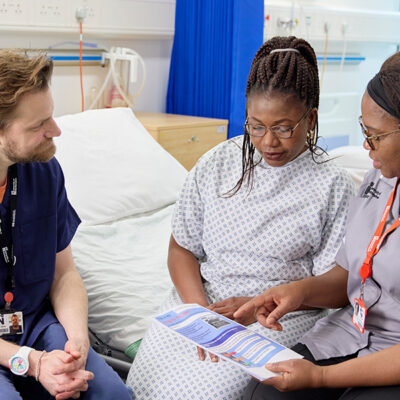
Learning Disability Nursing BSc (Hons)
Our course course will develop your understanding of the needs of people with learning disabilities to...
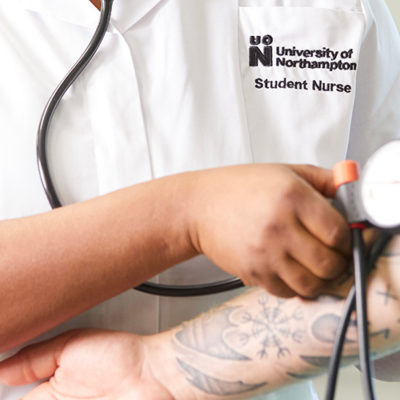
Nursing Associate FdSc
This is a 2 year full time FdSc with a 50/50 split between theory and practice...
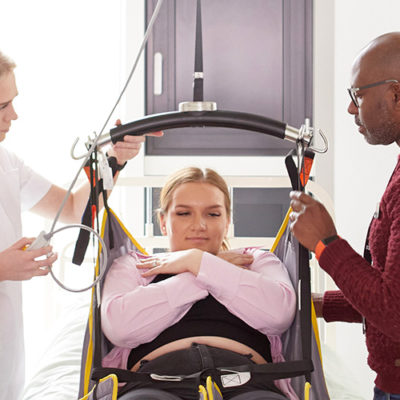
Occupational Therapy BSc (Hons)
The BSc (Hons) Occupational Therapy degree prepares you to work as a registered occupational therapist in...
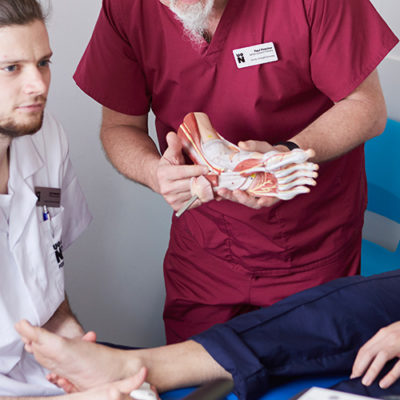
Podiatry BSc (Hons)
Our Podiatry course aims to produce graduates who are fit for practice within the NHS or...




